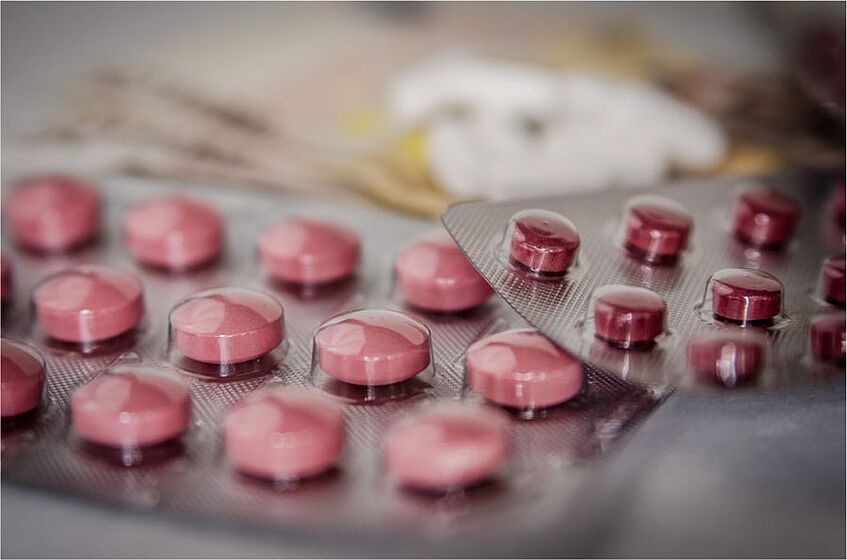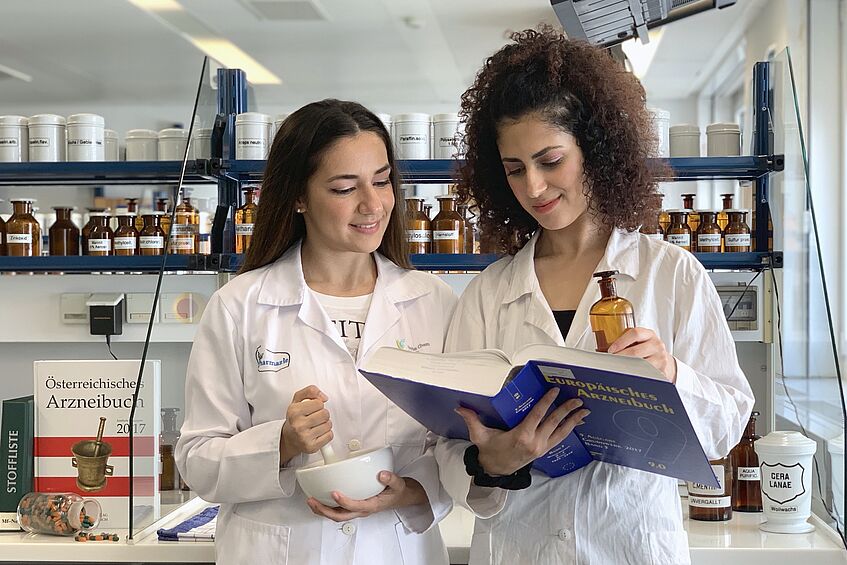Pharmacy (Master)

The master’s programme in Pharmacy equips students with comprehensive knowledge of the development, production, quality assurance, composition, preparation and storage, biological effects and interactions of pharmaceutical substances/drugs, as well as their safe use. Graduates are qualified to carry out academic research projects independently (including planning and implementation). They are able to integrate scientific methods and findings from the area of pharmaceutical sciences and of related scientific disciplines, and transfer and apply them to other issues. In particular, graduates of this master’s programme have the necessary knowledge and competences to inform, educate and counsel patients and doctors on all relevant pharmaceutical aspects.
Magister/Magistra
Degree Programme Code: 066 605
4 semesters / 120 ECTS credits
Language: German
NO entrance examination
Facts & Figures
- Students: n.a.
- Graduates in the last academic year: n.a.
- Number of semesters needed for graduation (median): n.a.
Data updated on: 03.12.2024
Attention
Instruction Language German
Please note that the instruction language of this programme is German. To start the degree programme, you need to hold a certificate of German proficiency on C1 level.
Admission Procedure
Information about the admission procedure
Information on Previous Studies:
In any case eligible degree programmes at the University of Vienna:
Getting started

© Mirjana Mandic
Study Programme
The master’s programme consists of 14 compulsory modules on the following subject areas: (Bio)pharmaceuticals with effect on metabolic disorders and impaired organ and system functions; anti-infectives, anti-neoplastics and (bio)pharmaceuticals with effect on the immune system; development of magistral formulae; (bio)pharmaceuticals with effect on the cardiovascular system; (bio)pharmaceuticals with effect on the nervous system; pharmaceutical technology and biopharmaceutics for master’s students; selected topics of pharmaceutical technology and biopharmaceutics; quality control of herbal medicinal products; medication therapy management and public health; evidence-based pharmacy; clinical pharmacy and pharmacoepidemiology; law for pharmacists; selected topics of pharmaceutical research; additional qualifications and scientific specialisation. In addition, students have to write a master’s thesis and pass a master’s examination.
Five Concepts
which you will deal with during your studies:
- Drug development
- Cardiovascular system
- Biopharmaceutics
- Anti-infectives
- Toxicology
...and many more.
Overview of the programme structure & topics
Here you find the current offer of courses for this programme to gain better insight into the topics and structure. For more information please click on the respective level.
After Graduation
Graduates are qualified to pursue a career in the following areas:
- public pharmacy
- hospital (pharmacy, clinical pharmacy)
- industry (research and development, production, drug authorisation, quality assurance)
- universities (research and teaching)
- testing institutes (forensic analysis, environmental protection, analysis of narcotics, medical service in the armed forces, residue analysis, control laboratories)
- national health service
- pharmaceutical wholesaling
- school (education of pharmaceutical apprentices)
- specialist publisher
Graduates' Perspective on the Degree Programme
Graduates ...
- say that this degree programme receives the grade: 2.4 (good)
- rate the level of difficulty as: 4.1 (high)
→ These results are basd on feedback from 16 graduates.
*You can find further assessments of the degree programme from its graduates’ perspective in the graduate survey of the Master’s programme in Pharmacy (in German).
Graduates ...
- find employment within 1 months after graduation on average.
- earn an average of € 4,592 (women) and € 4,741 (men) gross per month within three years after graduation.
- work full time at a percentage of 37% (women) and 45% (men) within three years after graduation.
*You can find further information on career entry and career paths in the tracking of graduates "Diploma Programme Pharmacy".
